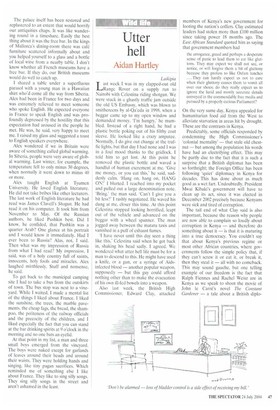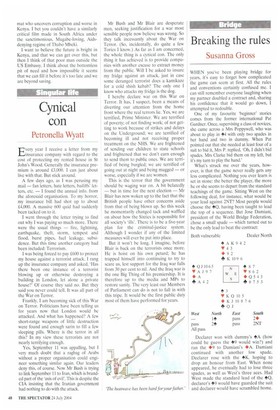Utter hell
Aldan Hartley
Laikipia Last week I was in my clapped-out old Range Rover on a supply run to Nairobi with Celestina riding shotgun. We were stuck in a ghastly traffic jam outside the old US Embassy, which was blown to smithereens by al-Qa'eda in 1998, when a beggar came up to my open window and demanded money. 'I'm hungry,' he mumbled. Instead of a right hand, he had a plastic bottle poking out of his filthy coat sleeve. He looked like a crazy amputee. Normally. I do give out change at the traffic lights, but that day I had none and I was in a foul mood thanks to the gridlock. I told him to get lost. At this point he removed the plastic bottle and waved a handful of human excrement at me. 'Give me money, or you eat this,' he said, suddenly calm. 'Hang on, hang on, HANG ON!' I blurted. I reached into my pocket and pulled out a large denomination note. 'Bring,' the man said. 'Can't I give you a bit less?' I rashly negotiated. He waved his dung at mc, closer this time. At this point Celestina stopped looking horrified, leapt out of the vehicle and advanced on the beggar with a wheel spanner. The man jogged away between the matatu taxis and vanished in a puff of exhaust fumes.
'I have never until this day seen a thing like this,' Celestina said when he got back in, shaking his head sadly. I agreed. We wondered what utter hell life must be for a man to descend to this, He might have used a knife, or a gun, or a syringe of Aidsinfected blood — another popular weapon, supposedly — but this guy could afford nothing other than to make the evacuation of his own ill-fed bowels into a weapon.
Also last week, the British High Commissioner, Edward Clay, attacked
members of Kenya's new government for looting the nation's coffers. Clay estimated leaders had stolen more than £100 million since taking power 18 months ago. The East African Standard quoted him as saying that government members had
the arrogance, greed and perhaps a desperate sense of panic to lead them to eat like gluttons. They may expect we shall not see, or notice, or will forgive them a bit of gluttony because they profess to like Oxfam lunches They can hardly expect us not to care when their gluttony causes them to vomit all over our shoes; do they really expect us to ignore the lurid and mostly accurate details conveyed in the commendably free media and pursued by a properly curious Parliament?
On the very same day, Kenya appealed for humanitarian food aid from the West to alleviate starvation in areas hit by drought. These are the contrasts in Kenya.
Predictably, some officials responded by condemning the High Commissioner's 'colonial mentality' — that stale old chestnut — but among the population his words have had an electrifying effect. This may be partly due to the fact that it is such a surprise that a British diplomat has been so forthright; the Foreign Office has been following 'quiet' diplomacy in Kenya for decades. This has done about as much good as a wet fart. Undoubtedly, President Mwai Kibaki's government will have to clean up its act, since it was elected in December 2002 precisely because Kenyans were sick and tired of corruption.
The tail end of what Clay said is also important, because the reason why people are now able to complain so loudly about corruption in Kenya — and therefore do something about it — is that it is maturing into a true democracy. You couldn't say that about Kenya's previous regime or most other African countries, where governments follow the simple policy that, if they can't screw it or eat it, or break it, then they steal it — all with no comeback. This may sound gauche, but one telling example of our freedom is the fact that Ralph Fiennes and Rachel Weisz are in Kenya as we speak to shoot the movie of John le Carre's novel The Constant Gardener — a tale about a British diplo
mat who uncovers corruption and worse in Kenya. I bet you couldn't have a similarly critical film made in South Africa under the sanctimonious, Mugabe-loving, Aidsdenying regime of Thabo Mbeki.
I want to believe the future is bright in Kenya, and that we can get over this, but then I think of that poor man outside the US Embassy. I think about the bottomless pit of need and how impossible it seems that we can fill it before it's too late and we are beyond saving.



























































 Previous page
Previous page